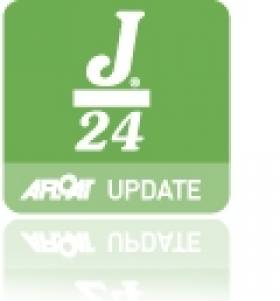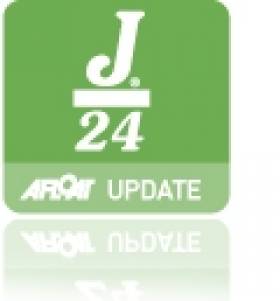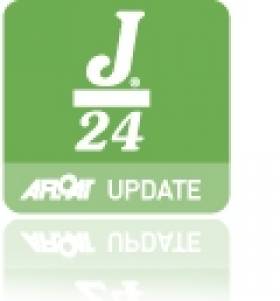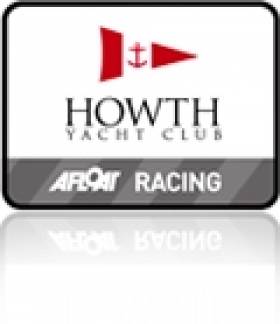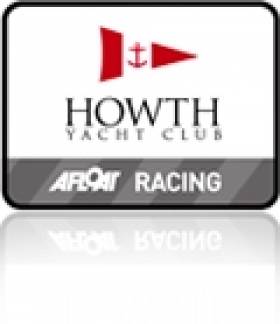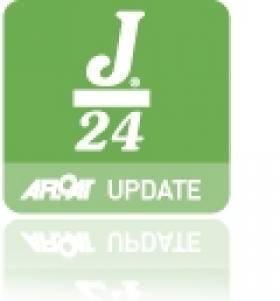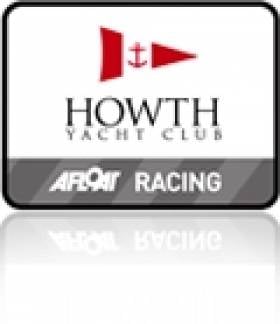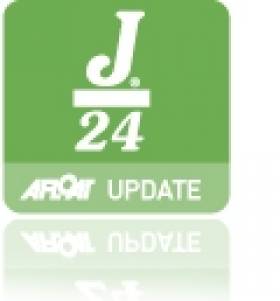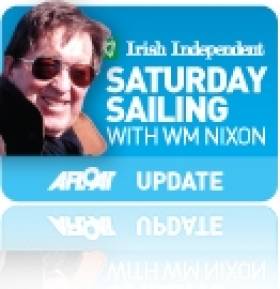Displaying items by tag: J24
Royal St.George Yacht Wins J24 National Title on Lough Erne
#j24 – Flor O'Driscoll's Hard on Port from the Royal St.George Yacht Club in Dun Laoghaire has taken the J24 national title for 2014 after three days of racing at Lough Erne Yacht Club in Co Fermanagh.
In the final day of racing at the Northern Ireland club, Hard on Port took line honours in the penultimate race of the day to set up the Royal St George Yacht Club entry for the title.
Stefan Hyde's RCYC entry, Hamilton Bear, pressed hard on the final day but was unable to mount a challenge strong enough to grasp the title away from the vastly experienced Munster man at the helm of Hard on Port.
Lighter winds were an ease to the competitors after the two previous days of gruelling conditions and with the sun shining down on Lough Erne, the trip up north paid off for the visiting boats.
Line honours for the last race of the day went to U25 crew on Kilcullen from Howth Yacht Club as local boat Jamais Encore pressed for a runner up spot.
Results:
Overall - Hard on Port Flor O'Driscoll RstGYC
Runner up - Hamilton Bear Stefan Hyde RCYC
3rd - Kilcullen Gordon Stirling HYC
4th - Jamais Encore JP McCaldin LEYC
5th - Crazy Horse Tim Corcoran Sligo
Change of J24 Leader as Big Winds Sweep Through Lough Erne
#j24 – Day two of the Irish J24 National Championships made for a gruelling affair for the competitors as winds gusted above 25 for most of the racing day writes Andrew Carey.
With it brought a change to the leaderboard with Flor O'Driscoll's Hard On Port taking line honours in the first two races of day two.
Unfortunately for the leader after day one, JP McCaldin's Jamais Encore, retirement from race one due to a damaged rudder meant that running repairs were called for as the fleet raced on in race two, but tantamount to the resolve of the Lough Erne boat, JP and his crew returned to take line honours in the final two races of the day.
With heavy winds and squalls rolling in off the north western shores, the 12 crews took their punishment as the country's best J24 boats battled and vowed for the lead which changed throughout the tight racing.
With 6 races sailed, Hard On Port has the lead by three points over Stefan Hyde's Hamilton Bear and Jamais Encore and further eight points back.
With two races to sail on the last day, close racing will again be to the fore as the top boats battle it out for the national J24 title.
Results after 6 raced
Hard on Port Flor O'Driscoll RsGYC
Hamilton Bear Stefan Hyde RCYC
Jamais Encore JP McCaldin LEYC
Kilcullen Gordon Stirling HYC
Crazy Horse Tim Corcoran SYC
J24s Off To A Blustery Start at Lough Erne Yacht Club
#j24 – Day one of the J24 Irish Nationals at Lough Erne Yacht Club got off to a blustery start in the Northern club yesterday as winds gusting up to 25–knots challenged the fleet of a dozen boats for honours over the first round of the three day event.
After two races, local boat Jamais Encore helmed by JP McCaldin has the jump on the fleet with a win in the first race followed by a 4th in race two as conditions settled.
Tight racing was the order of the day as the lead boats chopped and changed throughout the race legs. Race two honours went to Tim Corcoran at the helm of Crazy Horse from Sligo Yacht Club.
Overall, the top five boats in the class are separated from each other by just one point - Jamais Encore (JP McCaldin LEYC), Hamilton Bear (Stefan Hyde RCYC), Jellignite (Finbar Ryan LRYC), Crazy Horse (Tim Corcoran SYC) and Django (Martin MacNamara RWYCI / LRYC.
No Irish Boats For Swedish J24 Euros at Angelholm
#j24 – For the first time in decades, the European J/24 sailors are making a migration north into Scandinavia to sail the J/24 European Championship. The event takes place from the 9th to 15th of August and will be hosted by ASSS Sailing Club in Angelholm, south-west of Sweden. It follows a 42–boat Euro championships at Howth Yacht Club in Dublin last year. Thirty-seven teams are participating from seven countries (Denmark, England, Germany, Italy, Monaco, Sweden and USA) in 2014 but unfortunately there are no Irish entries this year.
The single largest contingent participating are the twenty-five German boats, mostly from the northern parts of the country. Many of their top sailors who've participated in past Europeans and Worlds are in attendance, as well as a number of their top women teams.
In addition to the five teams from Sweden, top America sailor Mike Ingham will be racing, as will Dennis Frederiksen from YC Monaco.
Top five in Monday's Tuneup Race
1. Front Runner, Per-Hakenn Persson, SWE
2. Vitesse, Manfred Konig, GER
3. Paget, Dennis Frederiksen, MON
4. El Nino, Mike Schmolling, GER
5. Flying Colours, William Pollock, GBR
Racing starts Tuesday and continues through Friday. More information here
J24 Crew Win Howth Yacht Club's Inaugural Sportsboat Cup
#hyc – Howth Yacht Club's new Sportsboat initiative attracted J24s, J80s and the visiting 1720 European championships for its first outing last weekend.
Well known cJ24 skipper Flor O’Driscoll and the crew of his J24 Hard On Port were the deserving overall Sportsboat Cup winners for 2014 and were awarded the Romaine Cagney Trophy.
Impressively, they did not count a result worse than second for the regatta and won half of the races. The popular winners have been stalwarts of the J24 class in Ireland who also have won several IRC titles in the well campaigned boat. They were only delighted to be taking another piece of silverware out of the Pale to Munster.
The cup was sailed in three days of glorious sunshine and light winds. Suncream and water were some of the most important parts of all crews’ kit every day as temperatures were consistently over 20 degrees. Water was especially important after many of the competitors were burning the midnight oil each evening. Racing was successfully completed on Sunday which incorporated the 1720 Europeans, the J24 Easterns and the Sailfleet J80s. The race officers did exceptionally well to get the full schedule of races completed on both race courses without any delays. The challenging conditions and a big shift meant that the last race of the day on Saturday for the 1720s had to be abandoned to avoid it becoming a lottery. PRO Derek Bothwell’s mantra that “It is better to have no race than a bad race” was a wise one. In any case, there was ample time to make it up on Sunday morning to get all eight races in.
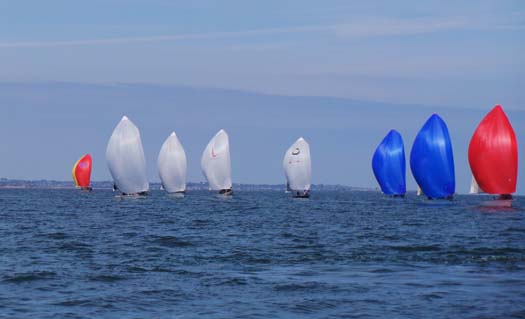
1720s made a welcome return to HYC after over a decade of absence
The 1720 Europeans came down to the wire and was decided in the last race to by the slimmest of margins. After a match race with Denis Murphy’s Aquatack in the last race, Peter O’Leary’s Jacobs Bar emerged victorious by just half a point overall to defend his title from last year. Not far behind the leading pair was a surprise performance from Kenneth Rumball on INSC.ie who rounded out the podium places. Maybe the Dun Laoghaire based team should travel to the events more frequently and the rest of the Dublin based fleet will too. The top performer from outside of Ireland came from Tom Forrestor-Coles and his crew from the south coast of the UK who finished fourth, just two points off the podium.
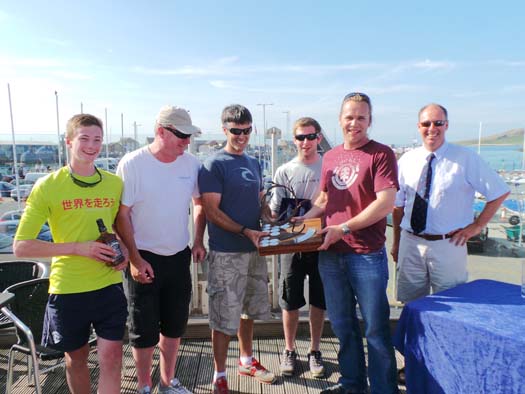
1720 winners. Pictured Adam Hyland, Cathal Cottrell, Peter O’Leary, Jamie Donegan & Youen Jacob
O’Learys title defence was impressive as earlier this year the boat was in a sorry state after being abandoned for years in a field in Baltimore. Left under a tree with the hatch open the boat was covered in leaves, dirt and the hull was full of water. Before they began the resurrection Cathal Cottrell even joked “We thought of entering the boat in the Chelsea flower show instead of the Europeans when we found her, and we nearly did”. After only rigging a new mast on Thursday night and splashing for the first time early Friday morning, they got off to a relatively slow start but definitely got into their rhythm on Saturday and hauled in Aquatack before conclusion on Sunday. Seventeen year old Adam Hyland was a welcome addition to the crew and O’Leary praised the young talent in his acceptance speech.
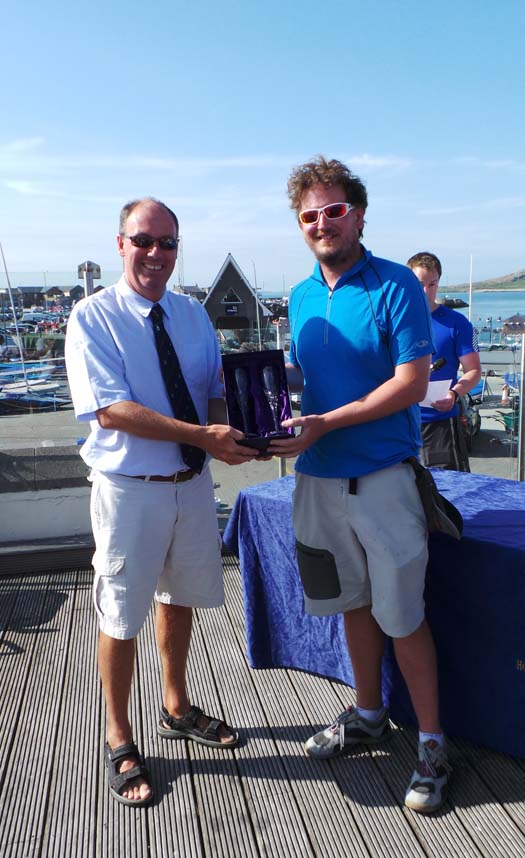
Eoin O’Fearghail
When the wind dropped on Saturday for the J24s and J80s racing was as rapid as Elephant Polo. The wind direction chopped and changed to the point where PRO Richard Kissane decided to abandon and restart Race 2. Whereas it didn't suit those doing nicely at the time, it was the sensible decision. The restarted race got away smartly in a bit more breeze allowing the fleet to get all scheduled races under their belts and home in time for tea and tiffin....and after-sun!
Sunday's racing was brought forward an hour to test those who were out the night before. A few cups of Blue Nun did nothing to slow up Flor O'Driscoll and his team who put in a stellar Sunday performance.
Lough Swilly's "Bandit" lived up to its name by putting in a sweet port tack start in Race 5. Open-jawed, the rest of the fleet took some time catching!
Overnight leader Stefan Hyde on Hamilton Bear had a wobbly start to the day but finished off the weekend with a well deserved bullet. In the last they weren’t able to push Hard On Port down the fleet enough in the last to snatch the overall title at the death, so it was second overall for them. Howth Yacht Club’s Under 25 Keelboat Team on Eurocarparks Kilcullen rounded out the podium in third place.
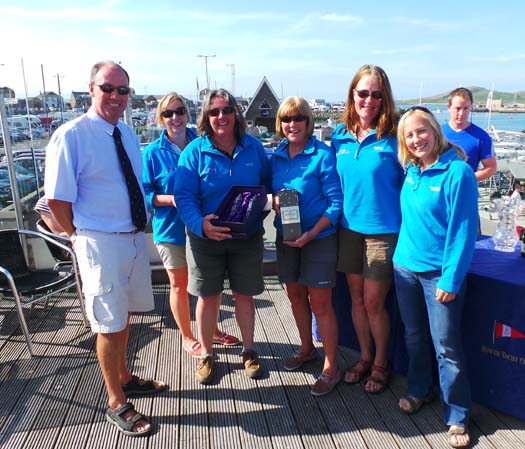
J80 winners. Joan Harris, Gillian Guinness, Elaine Taylor, Sally Watson & Linda Darbey
In the Sailfleet J80 class Gillian Guinness and her ladies team took the title ahead of Mossy Shanahan. In the closely fought class young Ewan McMahon finished a close third. With most of the fleet trading blows Gillian and her crew were very consistent and eked out a lead which meant they had the series wrapped up with a race to spare. There were even sightings of wine and other delights on the sail home each day on board. The bulk of the fleet from second to fifth place were separated by only four points. Exactly what you want and expect from such evenly matched one design racing.
Howth would like to thank all the competitors who made the event as good as it was and Edward Dillon who generously sponsored some prizes. We hope to have everyone back and even more classes involved when we run the event again in 2016.
Full Results here: http://hyc.ie/results
#hyc – With only a week to go anticipation is building for the inaugural HYC Sportsboat Cup at Howth in County Dublin writes Ross McDonald.Three fleets will be battling it out over two racecourses in what is promising to be a spectacular addition to the Irish racing calendar. Racing will begin on Friday the 20th June and run over the weekend on what is the longest day of the year.
Racing will start at midday each day but the fleets will be back on dry land in time to take advantage of the late evening sun. Post sailing music and barbeques are booked for each day along with a sailing supper by HYC's new chef Jason Dunphy (ex Rolys, Conrad and more) on offer for Friday evening. On Saturday evening there will be a midsummer celebration with a dinner dance organised so the club will certainly be a lively spot.
The 1720 Europeans will be held as part of the event which is drawing an international flavour to the racing, with boats travelling from the UK to compete for the title. This is the first time in several years that this event has been held out of the 1720 stronghold of Cork and it is giving the boats from Dublin a new lease of life. Entries are coming in from the host club as well as The Irish, The George and the INSC in Dun Laoghaire. That's not to mention all of the old heads that are popping up on some of the regulars boats to rekindle their love of the 1720 and impart some local knowledge while at it. Boats are starting to arrive this weekend with the aim of familiarising themselves with race area.
The J24 fleet will be hotly contested with several seasoned campaigners and previous regional and national champions battling it out for the title. The fleet have lots of experience racing in Howth and are returning to the battleground of last summer's Worlds and the Europeans from 2011.
The J80s will be populated with lots of notable sailors across a wide range of ages. From young Oppie champions to world match racers and everything in between this racing is promising to be memorable. With all the boats rigged and tuned identically this fleet will come down to nothing but the sailors skills.
As well as awarding fleet prizes a perpetual trophy will be awarded to the overall event winner. The details of how it will be decided will be revealed in the SI's.
There is still time to get an entry in. You can enter online here
J Boats Co–Founder Signs A Very Special J24 in Howth
#jboats – Back in the days of bespoke yachts, when a qualified naval architect had finally finished a new design to his satisfaction, he'd sign off on the drawings writes W M Nixon. Whether or not the contracted boatbuilder then adhered strictly to the plans was another matter. Often, any changes had to be counter-signed by designer and builder alike. But when it worked, it was a nice gentlemanly arrangement, in keeping with the times when boats were one-offs.
With today's production boats, there may well be a designer's or builder's signature somewhere on the finished product, but it will either be moulded-in, or machine-inscribed on an affixed metal plate. Any truly personal touch has long since gone. Yet now J/24 owner Emmet Dalton, Honorary Sailing Secretary of Howth YC, has obtained a uniquely personal signature on his boat's rudder which means that one particular small but precious area of his beloved sailing machine will never be cleaned off, sanded down, or re-painted, for it's a tangible reminder of the very special human and American story which underlies the origins of the mighty J Boat empire.
The story begins in 1975. Rod Johnstone, then an ad salesman for a sailing trade magazine and an active one-design sailor, decided to build a sailboat he had been designing since completing a Westlawn School of Yacht Design correspondence course in the 60's. With $400-worth of fibreglass and wood, plus some rigging and hardware left over from a Soling of his brother Bob, he built the 24' LOA x 9' beam Ragtime on weekends in the three-car garage at his family home in Stonington, Connecticut. During the summer of 1976, with an all family crew aboard, Ragtime beat everything in sight. Rod realized he had created something special.
Enter Everett Pearson, the owner of Tillotson Pearson, Inc, a highly respected boat builder in Warren, Rhode Island. He was quite taken with Rod's design and agreed to produce the boat on spec in return for the U.S. building rights. Display ads in the sailing trade magazine got the word out. That winter, they set up a makeshift factory in an old textile mill in nearby Fall River, Massachusetts, and began popping out J/24s.
Enter the marketing experience of brother Bob, a vice president of marketing at AMF/Alcort (the makers of Sunfish sailboats at the time). He had seen the potential in the boat Rod had designed. From 1975 to 1977, Bob had helped to take Alcort from the red into the black, and then began trying to convince AMF to start producing a boat similar to the J/24. When AMF didn't jump, in February of 1977 at age 43, Bob did, and threw in his lot with J/Boats.
In all, 5,400 J/24s have been built since, plus hundreds and sometimes thousands of other designs. It has been another case of the phenomenal commercial and creative power of American brothers working together. Think Gougeon Brothers with WEST Epoxy Systems, for instance, a company so successful that when the brothers retired, they handed it over to their employees as a very tangible way of saying thanks. And think too of Olin and Rod Stephens of designers Sparkman & Stephens. They were very much a team, and it was Rod's skill and ingenuity with rigs and rigging which persuaded the great Carleton Mitchell to transfer his design loyalties from Philip Rhodes to Olin Stephens, resulting in the 38ft Finisterre which won the biennial Bermuda Race three times on the trot.
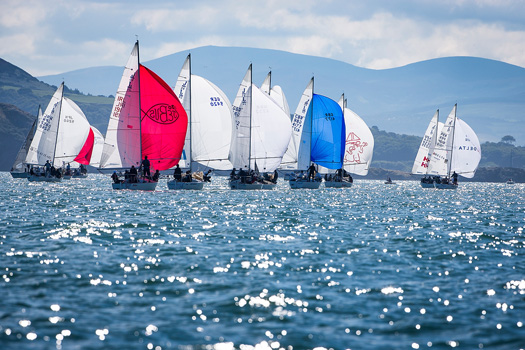
The J/24 Worlds 2013 at Howth set the bar for this special event. Photo: David Branigan
The Johnstone brothers are from the same sort of background, and with the global nature of the modern marine industry, such people are almost Godlike in our maritime world. So when the word got out that Bob Johnstone was recently visiting Howth to meet Irish J/24 President Flor O'Driscoll and see for himself the location of the memorable J/24 Worlds 2013, there was quite a fluttering in the dovecote. The opportunity was too good to miss. Emmet Dalton's J/24 Jebus is a very special boat. She was J/191 out of the moulds in America, and made with extra-special care in 1978 as she was then sent to Italy to be the plug for a new European J/24 construction facility, a plant which in its turn enabled the J/24 international expansion, and a setup which the brothers could call their own.
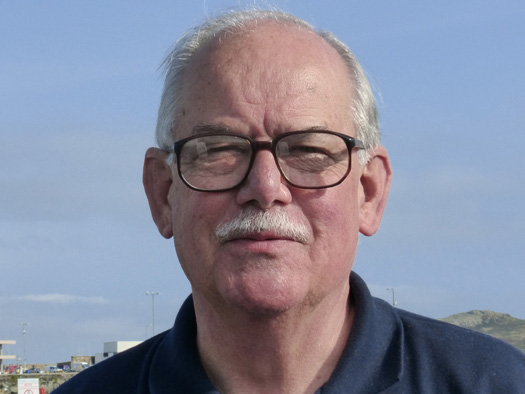
Robin Eagleson of Lough Erne YC, World President of the International J/24 Association. Photo: W M Nixon
So Jebus got the very special autograph with an indelible pen, and life in Howth returned to normal. Bob Johnstone and his wife were actually holidaying in Ireland with the President of the International J/24 Association, Robin Eagleson of Lough Erne YC. And it emerged that Mrs Johnstone is a minister of the American Episcopalian Church. Had they got to Cork, they could have exchanged notes with another sailing clergyperson, Paul Colton, the Bishop of Cork. And of course in the north, the Archbishop of Armagh, Robin Eames, has been so keen on sailing that he has had boats built by Chris Boyd, the Puppeteer man, one of them being a Puppeteer 330 called Nido, which is Odin spelt backwards.
Make of that what you will. For now, with Jebus and her signature, sailing has a new sacred relic.
Howth Yacht Club Launches Sportsboat Cup for 1720s, SB20s, Quarter Tonners, RS Elites, Dragons & J Boat Classes
#hyc – A Sportsboat Cup for Irish keelboat classes to be held around Midsummers day and tailored especially for 1720s, SB20s, Quarter Tonners, J24s, RS Elites, Dragons, J80s and J70s, is to be staged for the first time at Howth Yacht Club in north Dublin from 20th - 22nd June 2014.
At this multiclass event each of the sportsboat classes will be given their own start, results and prizes.
The event will incorporate the 1720 European championships as part of the event and there is an expectation of visiting UK and continental crews too.
Racing will be one design with the exception of the quarter tonners and mixed class who will race under IRC. Class rules will apply where applicable.
HYC says any other sportsboat type that has an IRC cert will also be accommodated in a mixed sportsboat fleet.
Howth is using the event to champion its sailing facilities both on the water and ashore at the 'bustling fishing village' venue that is also close to Dublin airport.
The largest club in the country has two cranes, a 300–berth marina, sizeable hardstanding, a large club house with bar, terrace and dining facilities not to mention secure changing and showering facilities
HYC is ideally placed to host this Sportsboat Cup. Car parking, craning, berthing and trailer storage are all included in the entry fee and racing will be organised by top National and International Race Officers.
With no racing starting before 12 each day there will be ample time to freshen up in the morning after the great social that is planned for each evening.
Online Entry available by clicking the HYC advert at the top of the Afloat homepage.
Record Sixth J24 European Title for Southworth & Crew
#j24 – Britain's Ian Southworth and the crew of Il Riccio, have clinched a record-breaking sixth J24 Europeans title from two former World Champions and four other past European Champions in a 67 boat fleet, in a challenging series hosted by Yacht Club de Monaco. Just two months after staging the J24 Worlds at Howth in Dublin, there was no Irish entry competing.
With most races sub seven knots, competitors had to adjust to the effect of wind-blown tide, shifts of 30 degrees and complete breeze shut-downs. With depths of 200-300 metres across the race area, mark positioning and start-line holding added to the challenges.
Racing from the Yacht Club de Monaco, twenty years after it first held the J24 Europeans, sailors from Germany, Italy , Hungary, Monaco, Great Britain, France and Greece were joined by North American J24 ace, Mike Ingham and by four times World Champion, Mauricio Santa Cruz of Brazil. Former Italian World Champion, Andrea Casale led a serious challenge in Kong Easynet, with the Italian Navy team of La Superba, helmed by past European Champion, Ignazio Bonnano, pushing to improve their 8th place at the 2013 Worlds in Howth. German hopes were led by former European Champion, Peer Kock
The predominately light airs series presented multiple challenges both for the race crews and for the Race committee, led by Race Officer, John Coveney.
The il Riccio team used a 1996, J Boats Italy hull, race prepared by David Heritage in Cowes and Sparloft New Zealand rig. Sails were the same as the Howth Worlds, but with a change of genoa design to test the North San Diego, Tim Healey modification.
The womens' Europeans trophy was won by Germany's Ragna Thoennessen from Altona Yacht Club and her crew on Juelssand ,from Lea-Katrina Witt and the Hamburg German crew of Alice and Francesca Guzzo and her Monaco team, sailing Cool J.
Final top fiveL
1. Chris MacLaughlin (Il Riccio), GBR, 23 points
2. Mauricio Santacruz (Bruschetta), BRA, 49
3. Ian Ilsley (St Andrews Securities), MON, 51
4. Ignacio Bonanno (La Superba), ITA, 66
5. Dimitris Altsiadis (Evniki), GRE, 78
www.j24ycm.org/index.php/the-j24/9-blog/13-latest-news
#hyc – Howth is an odd old place, and those of us who live on this rugged peninsula on the north side of Dublin Bay readily accept that view. Peninsular folk anywhere are invariably odd, so that's Proposition One settled immediately. And as for old? Well, in the Irish context, Howth is as old as you can get. So old, in fact, that it's not really Irish at all. The rocks of Howth are around 600 million years old, give or take a few weeks. But the rocks of nearby Ireland are only 300 millions years old. So once you've settled into Howth, you find yourself thinking of Ireland as that dodgy new place somewhere over to the westward, a weird landmass that could disappear as easily and quickly as it arrived.
The only real problem with Howth is the tombolo. That's the strip of sand which connects us to this new place called Ireland. Almost within recorded history, and certainly within folk memory, Howth was an island, and happy with it. But once the sand built up and provided a causeway, we had to accept the new neighbours, and even interact with them. Thus today Howth is administratively part of Fingal, that intriguing area which used to be North County Dublin, but was Fingal long before that, and for a long time too. It's a place of fine farmland and a much indented coastline, with five proper islands including the handsome Lambay and the precipitous Ireland's Eye, and a substantial rock – Rockabill – which is big enough to support a lighthouse, several former keepers' houses, and the world's largest colony of roseate terns.
In all, the coastline of Fingal is about twenty miles in the shortest distance between the Baily headland to the south, and the crowded little port of Balbriggan to the north. But if you measured it in any detail, you might well approach a hundred miles. Off this coast is a sea well filled with fish of all kinds, and though it has tidal currents, they generally aren't too strong for comfort. So it's an ideal place to sail, and a fascinating little cruising venue in its own right.
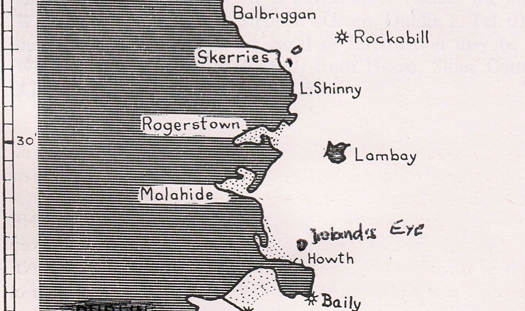
Seen independently of Dublin Bay, the coast of Fingal can be a fascinating sailing venue in its own right.
The reason it isn't more widely seen as such is the D-word. The elephant in the room. The great heaving mass which is Dublin, right next door. Despite its unique attractions and more interesting sailing waters, the coast of Fingal is invariably perceived as less glamorous than high-powered overcrowded Dublin Bay just round the corner. These days, that's often an advantage. Dublin Bay can take care of the social froth, while the waters of Fingal accommodate their own time-honoured forms of sailing.
But every so often Howth Yacht Club attracts a major international event to the usually quiet waters of Fingal, and this has the welcome effect of making us waken up and see our home port and its waters anew. It also makes us marvel at the underlying levels of voluntary enthusiasm and organisational ability within our club membership, while at the same time reinforcing useful community spirit with the village and the larger neighbourhood of Fingal.
So this past week we've been seeing Howth through the eyes of the sailors of many nations in the BMW J/24 Worlds 2013. They seem to like Howth and Fingal, and Howth certainly likes the J/24 people. You can warm to a class which has the intriguing history of having been conceived 35 years ago in an American garage which just happened to be big enough to accommodate a completely new 24ft one design boat which was so innovative that that it took off worldwide at record speed. But it is still basically such a homely concept that although the J/24 was uber-cool in its most popular days, it was never unpleasantly glitzy, and today it is finding its greatest strengths through owners of all ages who are happy to make the best of hulls which are no longer in the first flush of youth, yet provide great sport without an outlay which might break the bank.
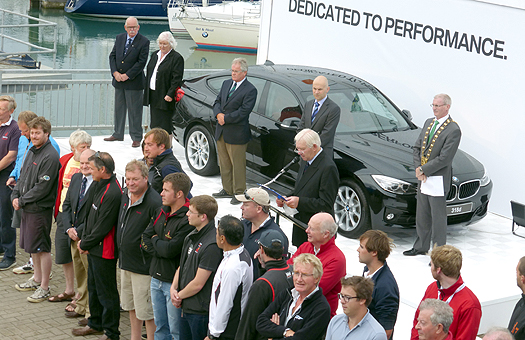
The opening ceremony, with the skippers fronting the platform as Organising Committee Chairman Derek Bothwell outlines the programme Photo: W M Nixon
Nevertheless, when a class has been accepted so enthusiastically that it is arguably the Number One Global Local One Design, staging its World Championship makes ferocious demands on a club. We needn't go into the details, but I do know that in Howth an organising committee headed by former commodore Derek Bothwell (no slouch on the race course himself), has been beavering away for a long time, and as the set date of August 25th 2013 drew nearer, increasing numbers of volunteers were brought on stream and sub committees came into being to deal with matters of which your ordinary sailing Joe knows nothing.
That same ordinary sailing Joe may make smartass comments about it being just another World Championship in a sport which has so many international classes that each year there are something like 143 new world title holders. But that really is what true sailing is all about. Sailing is a vehicle sport, and different vehicles suit different folks. So if a class merits international status, then its World Championship merits the full lineup of umpires and international jurors and the entire paraphernalia of administrators prepared to function in a global setup. It's mind-boggling, yet people are prepared to take it on with enthusiasm, and when you see a championship taking shape on the water, you begin to understand what it's all about.
After all the behind-the-scenes work, it begins to go public, usually with a national open championship, and then with the Worlds proper. This invariably begins with an opening ceremony which is planned to hit the right note of seriousness without becoming too pompous, while at the same time suggesting that sport will be paramount, but everyone might just have a bit of fun along the way.
The layout in the Howth YC marina complex was used to good effect with a top local piper, Ken Sheridan of a distinguished local seafaring family, leading the contending skippers in last Saturday evening, headed by defending champion Mauricio Santa Cruz of Brazil. Say what you like about bagpipes (and most people do), but it's a distinctive instrument, giving out an unmistakable sound which clearly identified the focus of the action, and led straight into speeches of merciful brevity with the actual opening being performed by the Mayor of Fingal, Councillor Kieran Dennison, to the approval of a large and light-hearted crowd on the club balcony.
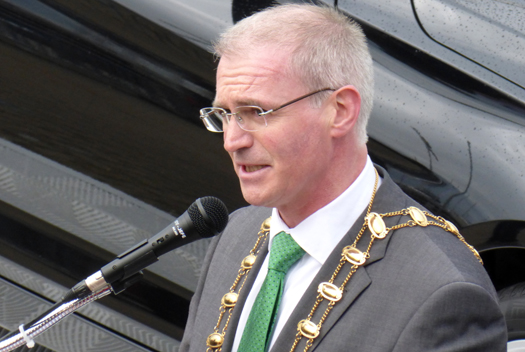
The Mayor of Fingal, Cllr Kieran Dennison, officially opens the championship. Photo: W M Nixon
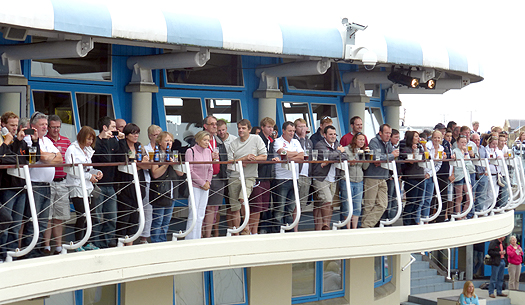
HYC's unique balcony. At times like this, we can only hope the architect has got his calculations right Photo: W M Nixon
As he leads a council which runs Ireland's fastest developing territory, and includes within its ambit such powerful amenities as Dublin Airport and Howth Harbour (not to mention half a dozen of the top golf courses in Ireland), Councillor Dennison would be just the man to be our new Head of State after we declare the new and gloriously independent Republic of Fingal. But that's another day's work. Meanwhile, Principal Race Officer David Lovegrove (another former HYC Commodore) and his team had to put in a practice race next day (Sunday August 25th) which went well in sunshine and a northerly breeze. And as many of the more seasoned campaigners have a superstition that you should never cross the finishing line in the practice race, the popular JP McCaldin of Lough Erne YC was surprised and delighted to find himself atop the winners podium.
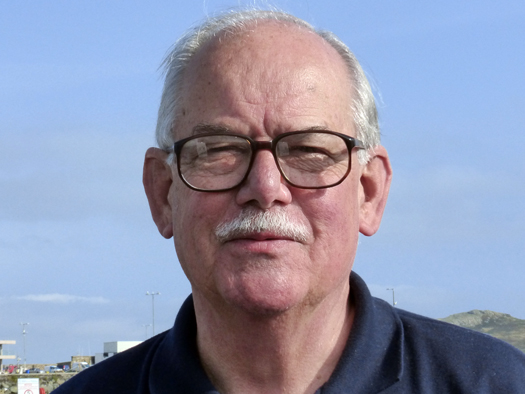
Robin Eagleson from Lough Erne, the amiable President of the J/24 International Association, was persuaded to look appropriately statesmanlike. Photo: W M Nixon
This was a timely reminder that in the tortuous worldwide web of J/24 politics, a leading role is played these days by the global class president, Robin Eagleson of Lough Erne. He's usually such an easygoing and amiable guy that it's sometimes difficult to accept that, in the world of J/24 administration, he's seen as an awesome figure of statesmanlike status who can steer contentious issues to a peaceful and successful conclusion in hot-tempered committee rooms. Somehow next morning I managed to persuade him to look statesmanlike when I was taking his photo while heading towards an appointment with that legend of Howth sailing, Neville Maguire, to go out on his 23ft twin-screw motor cruiser to see a day's racing.
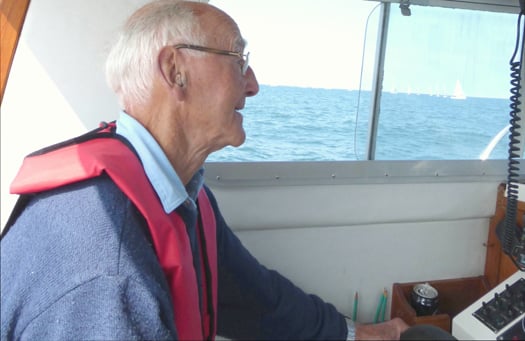
Our skipper for the day, veteran sailing superstar Neville Maguire Photo: W M Nixon
You wouldn't dream of asking Neville's age, but I know his 80th birthday was celebrated quite a few years ago. He started winning the first of many Helmsman's Championships of Ireland shortly after the competition was inaugurated in 1946. He has won major titles in many classes, and an apotheosis of Maguire family sailing achievement came in the last weekend of August 1984, when Neville won the last race of the Irish Sea offshore programme to win the ISORA Championship with his much-loved Club Shamrock Demelza, and on that same day in Kerry, his son Gordon won the recently inaugurated Irish Windsurfing Nationals in the early stages of a hugely successful international sailing career.
The word is good on Gordon, currently the champion offshore skipper in Australia. His successful five year linkup with Stephen Ainsworth and the wonderboat Loki came to its planned conclusion in January of this year, but Gordon is sailing as much as ever – tomorrow he's on the helm on the mini-maxi Caola Isla in the Maxi Worlds in Sardinia, and then in November the new Ichi Ban for top Australian owner Matt Allen is due to be delivered from the builders in Dubai to Sydney, where Gordon and the team will tune her up for the Sydney-Hobart race on December 26th.
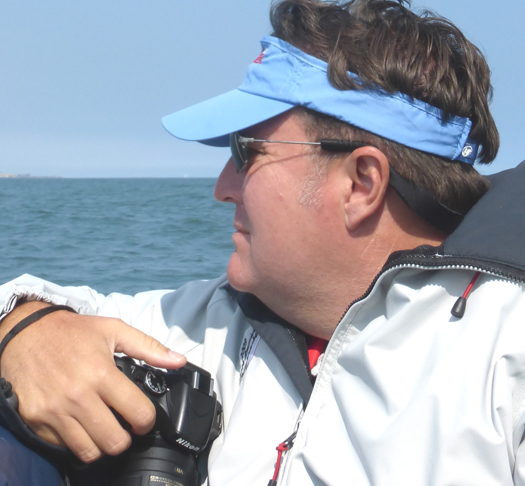
Chris Howell, Executive Director of the International J/24 Association, is also director 0f class associations for the J/22, the J/105, and the new J/70. Photo: W M Nixon
Also on board Neville's neat powerboat was Sean Flood, whose zest for boats and sailing remains undimmed, and fourth member of a congenial ship's company was Chris Howell from America, who was there in his capacity as Executive Director of the International J/24 Association. An interesting man. He graduated in a degree course in managing non-profit-making organisations (I hasten to add that they're planned not to make a profit – we're not talking Ireland these past six years). Clearly, he has found his vocation in running one design boat associations, which is not for the faint-hearted. In addition to the worldwide J/24 Association, he also runs the J/22 Class Association, and in North America the J/105 association. Most recently, he has also been given the key role in the class association for the J/70, which has taken off like a rocket since it made its debut with 46 boats straight out of the wrappers at the first series at Key West in January, and had 90 boats signed up within 24 hours of the announcement for the first North American Championship at Annapolis next month.
But off Howth, Chris was total in his devotion to the J/24, and he gave us a fascinating insight into regulating a class in which reasonably good hulls can be bought for 5000 dollars, but some people will then be prepared to spend much more on their sails than they have initially spent on the boat. Others feel that some restriction on new sails, and particularly on extremely expensive high-tech sails, is the best way to help the class go forward in its role as the boat of choice for impecunious international sailing wannabees, a category of sailor well represented from several countries in the racing at Howth.
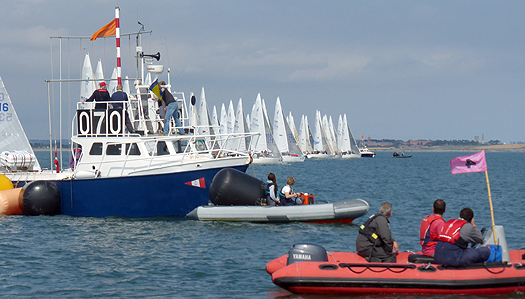
The championship is under way. A clean start for the first race of the J/24 Worlds 2013. Photo: W M Nixon
That first day, we'd to wait until the breeze settled in from the northeast, but when it did it was remarkably steady despite being only in the 5 to 7 knot band. The first race was a cracker, and though those of us with gambling instincts were with Flor O'Driscoll as he took a wild flyer out to the right, there was soon no mistaking the better progress being made by the American hotshots out to the left of the beat, though those who overdid the left side were also punished.
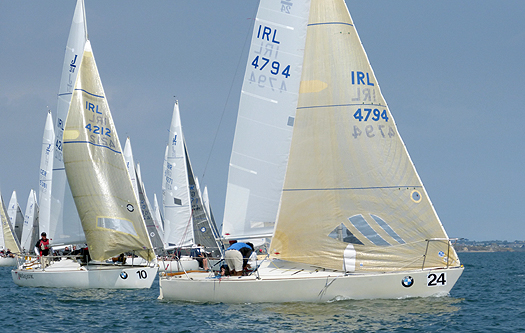
Flor O'Driscoll took a spirited flyer to the right in race one....... Photo: W M Nixon
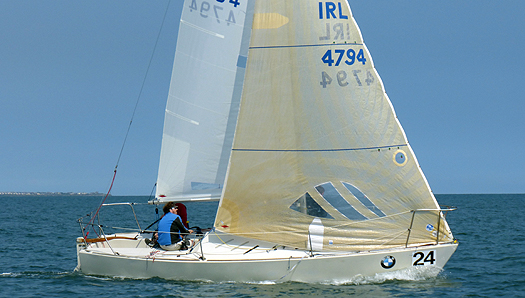
....and looked to be going well in a private breeze........ Photo: W M Nixon
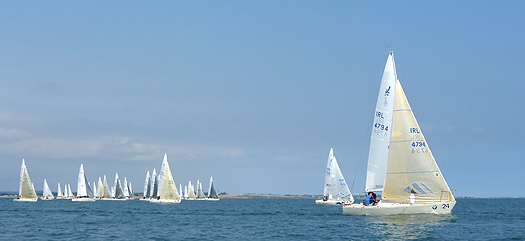
.....but soon reality intervened...... Photo: W M Nixon
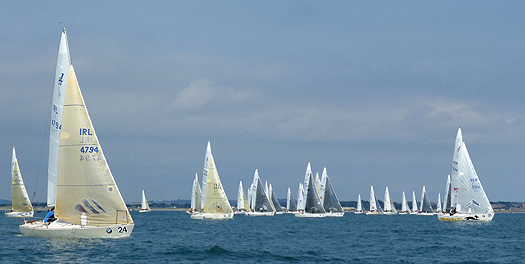
....and the O'Driscoll challenge for the first beat was down the tubes. Photo: W M Nixon
The flood tide was pushing towards north'northwest across the beat, and by the weather mark several had underestimated its effects, but Tony Parker of Annapolis came first to the mark neatly on port after judging the beat and the tide to perfection. But in conditions like that, the long slow run was bound to be painful for the leader. However, Parker hung onto his lead on the second beat, albeit by a much smaller margin from Keith Whittemore from Seattle, and down the run to the finish Parker gave a masterclass in defending his position, such that Whittemore found himself being challenged for the second slot by world title defender Mauricio Santa Cruz. But Whittemore hung in there to make it one two for the US in the sort of conditions they know best (they'd come to Ireland expecting heaps of wind).
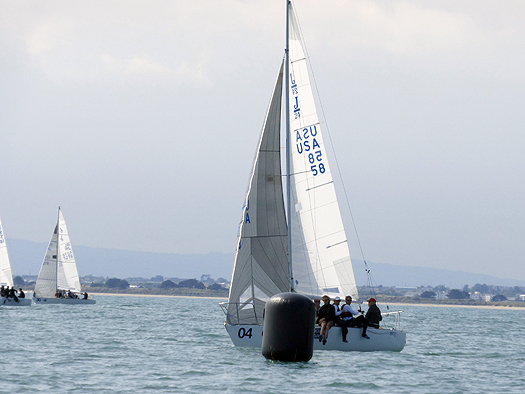
Tony Parker arrives first at the weather mark after a perfect reading of the initial beat Photo: W M Nixon
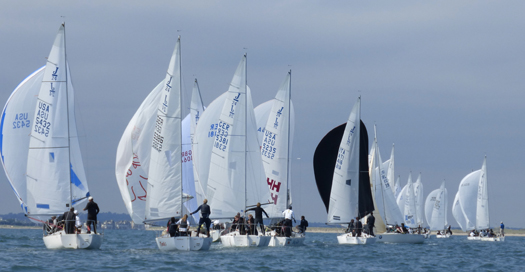
On the downwind leg, the spread of the fleet soon showed the effect of tide across the course Photo: W M Nixon
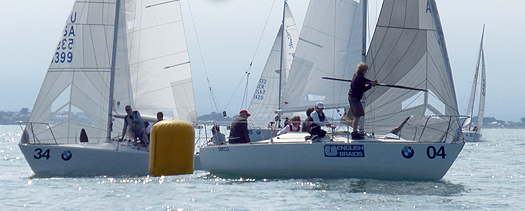
At the weather mark second time, Parker finds himself more closely challenged by Keith Whittemore Photo: W M Nixon

How could this be explained to non-sailing spectators? It's actually an exciting stage of the final run, with Tony Parker (fourth right) keeping control over closest challenger Keith Whittemore (seventh left), while also keeping an eye on third-placed Mauricio Santa Cruz (third right). Photo: W M Nixon
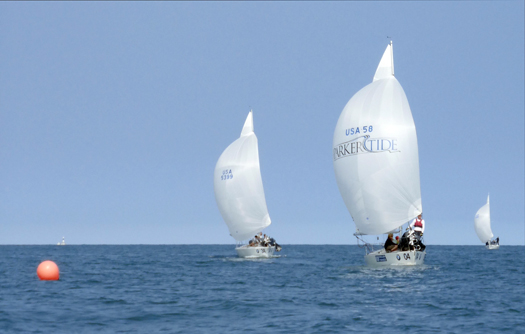
Closing on the finish, Parker has consolidated his lead over Whittemore........ Photo: W M Nixon
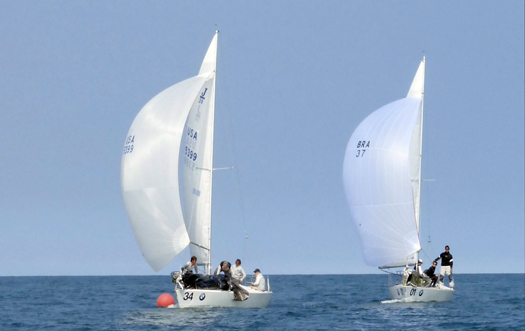
.....who is being challenged in the final stages by defending World Champion Mauricio Santa Cruz of Brazil Photo: W M Nixon
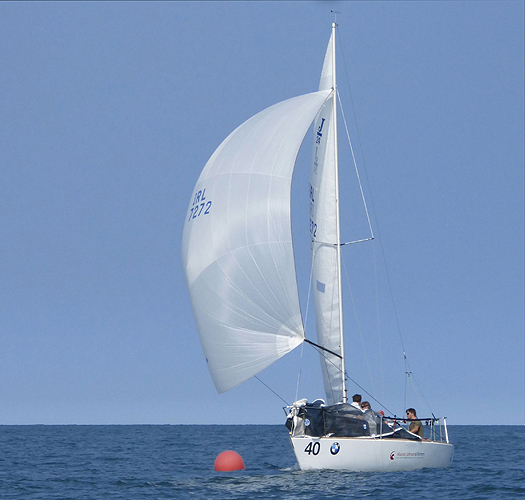
Best of the Irish in the first race was Stefan Hyde, who placed seventh, while the Murphy/Darrer crew in Stouche were 10th to have two Irish boats in the top ten Photo: W M Nixon
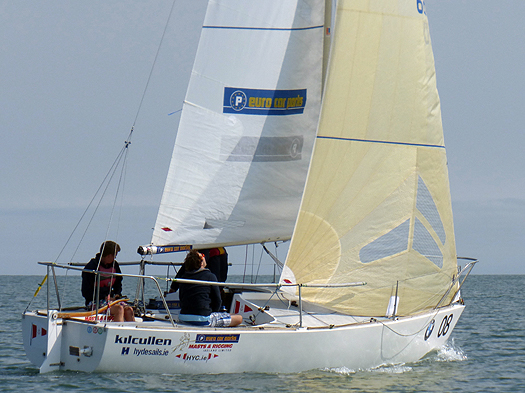
"The Nippers" - Howth YC is fielding an under-25 crew in Kilcullen Photo: W M Nixon
One good race was in the can, the Worlds were properly underway, and at the helm of his RIB the Organising Committee Chairman was one happy budgie. The mood was given an added dimension by an historic Howth 17 gently making her way past the post-race fleet with all sail set to the jackyard tops'l. her 115 years class history putting the supposed maturity of the J/24s into perspective. Then another race was put through after manners were put on everyone with a black flag, and though the next day's racing was to be glassed out, lost completely to calm, the foundations of a championship had been put in place.
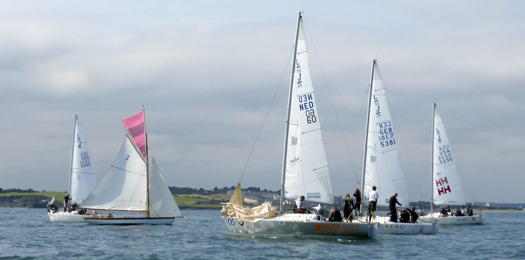
Blast from the past – the Howth 17 Pauline (class founded 1898) makes her way past the fleet after the finish Photo: W M Nixon
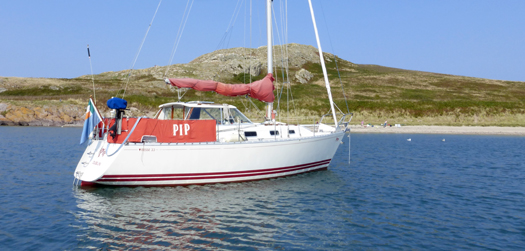
Gerry and Barbara Sargent's Vitesse 33 Pip in the summer anchorage off Ireland's Eye....... Photo: W M Nixon
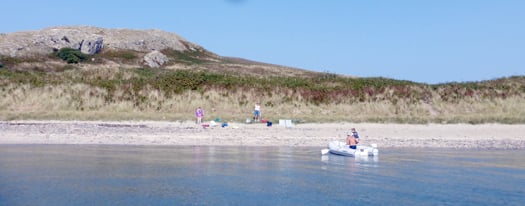
...while on the beach, senior sailors and their grandchildren mess about in boats Photo: W M Nixon
We made our way gently back to Howth's haven under the hills as the afternoon drew on, past a couple of cruisers lying in the anchorage at Ireland's Eye where senior sailors and their grandchildren messed around with boats on the beach, and everything looking very well in a sailing world seen afresh. That evening the party in the club was cheerful, but I'd other duties to perform. It was time for the dog's evening romp on the beach right next to the harbour. It's not every international sailing venue which can provide you with the convenient opportunity to do that. But in Howth, it's an integral part of the package.
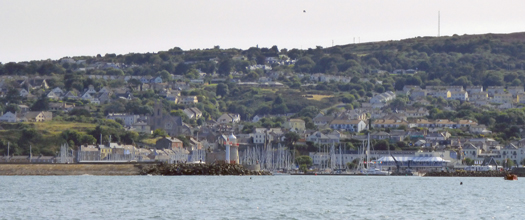
The haven under the hill. Howth is Fingal's main harbour. Photo: W M Nixon


























